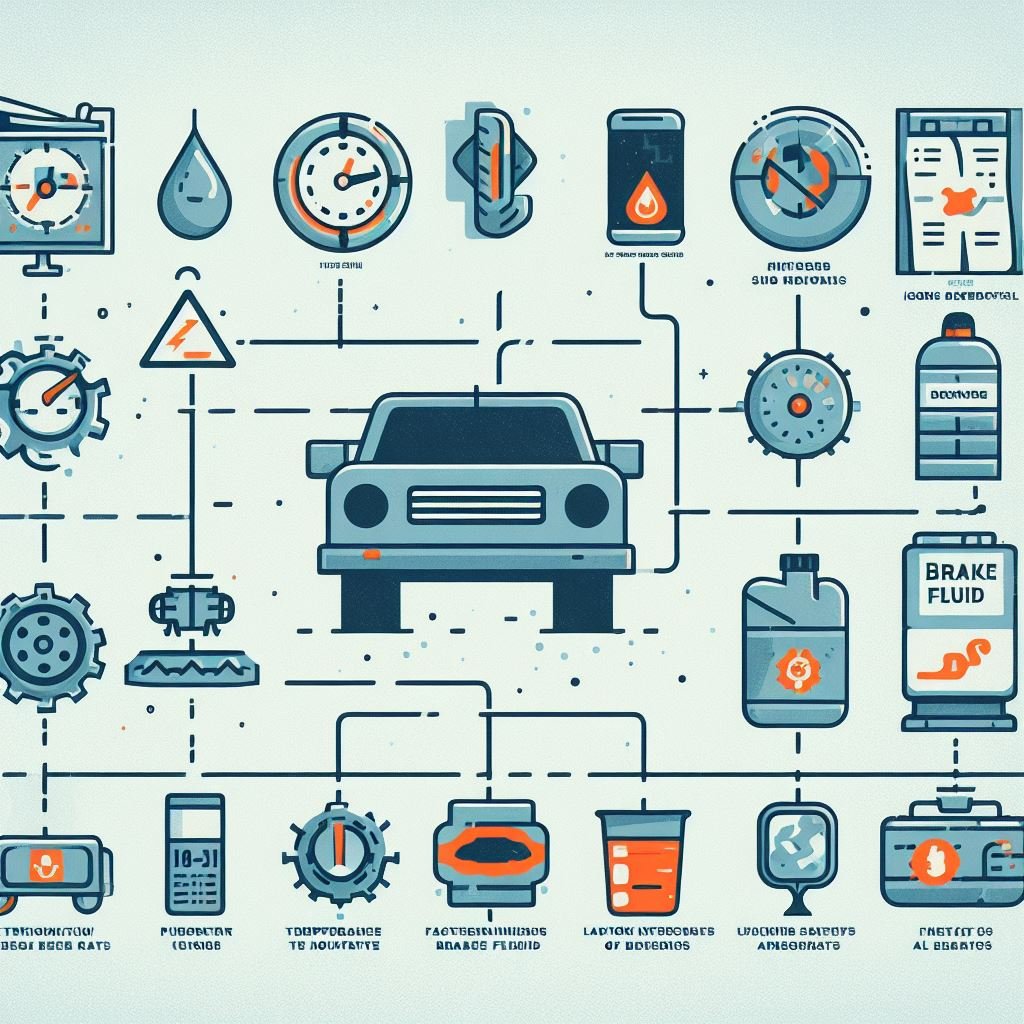You’re driving down the highway, enjoying the scenery and feeling the wind in your hair. Suddenly, the car in front of you slams on their brakes and you quickly hit yours, only to realize that they aren’t working properly. Panic sets in as you struggle to bring your car to a stop.
This is a scary reality for many drivers, and it’s all because of one small component: brake fluid. In this blog, we’ll dive into the world of brake fluid and how ABS, or anti-lock braking systems, play a crucial role in keeping us safe on the road. Say goodbye to worries and let’s explore the important relationship between brake fluid and ABS.
brake fluid abs
| The importance of brake fluid cannot be overstated in keeping your vehicle safe and functioning properly. | ABS, or anti-lock braking system, is a crucial safety feature that prevents your car’s wheels from locking up during hard braking, allowing you to maintain control of the vehicle. | Checking your brake fluid regularly is essential to ensure that it is at the proper level and in good condition, as low or contaminated brake fluid can compromise the effectiveness of your brakes. |
| Always use the recommended type of brake fluid for your vehicle to ensure optimal performance and avoid potential damage to your braking system. | ABS warning lights on your dashboard may indicate a problem with your ABS system, which should be addressed by a professional mechanic as soon as possible. | In case of an emergency, knowing how to properly use your ABS system can help you avoid accidents and potentially save lives. |
| Brake fluid is a hydraulic fluid that transfers the pressure from your foot on the brake pedal to the brakes themselves, making it an integral component of your braking system. | ABS is designed to work in conjunction with your regular braking system, providing additional safety and control in emergency situations. | Regularly flushing and replacing your brake fluid is necessary to maintain its effectiveness and prevent corrosion in your braking system. |
| Brake fluid can absorb moisture over time, which can lead to reduced performance and potential damage to your braking system. | ABS helps to prevent skidding and loss of control on wet or slippery roads, making it an important safety feature for all weather conditions. | Ignoring warning signs of low or contaminated brake fluid can lead to costly repairs and put your safety at risk. |
| It is recommended to have your brake fluid and ABS system checked during routine maintenance to ensure they are functioning properly. | In addition to regular maintenance, be sure to follow your vehicle’s owner’s manual for specific guidelines on brake fluid and ABS maintenance. | Remember, brake fluid and ABS are essential for safe driving, so always prioritize their maintenance and address any issues promptly. |
| By understanding the importance of brake fluid and ABS, you can ensure the safety and longevity of your vehicle’s braking system. | Proper maintenance and care of your brake fluid and ABS can also improve your vehicle’s overall performance and prolong its lifespan. | Make sure to educate yourself on brake fluid and ABS and stay vigilant in keeping them in good condition for a safe and smooth driving experience. |
What is Brake Fluid ABS?
Have you ever felt your heart race as you slammed on the brakes to avoid a collision? Or perhaps you’ve experienced that dreaded moment when your car skids on a wet road, and you feel like you’ve lost all control. In these situations, having a reliable braking system is crucial for your safety and the safety of others on the road. That’s where brake fluid abs comes in.
This often overlooked but essential component plays a significant role in your car’s braking system and can be the difference between a close call and a catastrophic accident. In this article, we will take a closer look at brake fluid abs and uncover its importance in keeping you safe on the road. So buckle up and get ready to learn more about this critical element of your car’s braking system.

Signs That You Need to Replace Your Brake Fluid ABS
What is Brake Fluid ABS and Why is it Important? Brake fluid ABS is a crucial component of any vehicle’s braking system. It is a specialized hydraulic fluid that plays a critical role in ensuring the smooth and efficient operation of your brakes. But what exactly is brake fluid ABS and why is it so important?
- Understanding the Basics: In simple terms, brake fluid ABS is a type of hydraulic fluid that helps transfer force from the brake pedal to the brake pads, allowing you to stop your vehicle when needed.
It is a non-compressible fluid that is essential for maintaining the high pressure needed to operate the brakes.
- The ABS Factor: ABS, or anti-lock braking system, is a safety feature in modern vehicles that prevents the wheels from locking up during sudden or hard braking. This is achieved by using sensors to monitor wheel speed and adjusting brake pressure accordingly.
Brake fluid ABS plays a crucial role in this process by maintaining the necessary hydraulic pressure for the ABS system to function properly.
- The Importance of Routine Maintenance: As with any vehicle component, brake fluid ABS requires regular maintenance to ensure optimal performance. Over time, brake fluid can become contaminated with moisture, dirt, and other debris, leading to decreased braking efficiency and potentially damaging the ABS system.
Regularly checking and replacing brake fluid ABS can help prevent costly repairs and ensure your vehicle’s safety on the road. In conclusion, brake fluid ABS is a vital component of your vehicle’s braking system that is responsible for keeping you safe on the road. Without it, your brakes would not be able to function properly, and your vehicle’s ABS system would be rendered useless.
So the next time you press down on your brake pedal, remember the crucial role that brake fluid ABS plays in ensuring a smooth and safe driving experience.

The Consequences of Not Replacing Your Brake Fluid ABS
Discover the Importance of Brake Fluid and ABS for Your Vehicle Are you familiar with the term “brake fluid” or “ABS”? If you’re a car owner, chances are you’ve heard of these terms before. But do you really know what they mean and how crucial they are for the proper functioning of your vehicle? In this article, we’ll take a deep dive into the world of brake fluid and ABS, and explore their significance in keeping you safe on the road.
- What is Brake Fluid?
- Understanding the Role of ABS
- The Connection Between Brake Fluid and ABS
- The Dangers of Neglecting Brake Fluid and ABS Maintenance
- The Importance of Regularly Checking and Replacing Brake Fluid and ABS Components
As a car owner, it’s essential to educate yourself about the inner workings of your vehicle to ensure its longevity and your safety.
So, let’s buckle up and dive into the world of brake fluid and ABS.
Statistical Information: brake fluid abs
| In the United States, brake fluid is required by law to meet certain standards set by the Department of Transportation (DOT). | According to a study by AAA, nearly one-third of vehicles on the road have low or contaminated brake fluid, putting them at risk for brake failure. | Brake fluid is a type of hydraulic fluid that is responsible for transferring force from the brake pedal to the brakes, allowing your vehicle to stop. |
| The most common type of brake fluid is glycol-based, and it is typically classified into DOT 3, DOT 4, and DOT 5 categories based on its boiling point and viscosity. | DOT 3 brake fluid is the most commonly used type and is required for most vehicles, while DOT 4 and DOT 5 fluids have higher boiling points and are typically used in high-performance vehicles. | In addition to its role in stopping your vehicle, brake fluid also helps to lubricate and protect the various components of your braking system, preventing corrosion and wear. |
| Over time, brake fluid can become contaminated with moisture, which can lower its boiling point and cause brake failure. | It is recommended to have your brake fluid checked and replaced every 2 years or 24,000 miles, whichever comes first, to ensure optimal performance and safety. | Brake fluid can also become contaminated with air bubbles, which can cause a spongy feeling in the brake pedal and decrease braking performance. |
| When checking your brake fluid, be sure to also inspect the condition of the brake lines and hoses, as they can also affect the performance of your brakes. | If your brake fluid is low, it could be a sign of a leak in your braking system, which should be addressed immediately to prevent potential accidents. | If your vehicle has an anti-lock brake system (ABS), it may require a specific type of brake fluid, so be sure to consult your owner’s manual or a professional mechanic. |
Frequently Asked Questions
What is brake fluid and why is it important for my car’s ABS system?
Brake fluid is a type of hydraulic fluid that helps transfer pressure from the brake pedal to the brake pads, allowing your car to stop. It is essential for the proper functioning of your car’s anti-lock braking system (ABS).
How often should I check my brake fluid levels and how do I know if it needs to be changed?
It is recommended to check your brake fluid levels every time you have your car serviced. You can also check the levels yourself by looking at the fluid reservoir and ensuring it is between the minimum and maximum marks. If the fluid is dark or has a burnt smell, it may need to be changed.
Can I use any type of brake fluid for my ABS system?
No, it is important to use the type of brake fluid specified in your car’s manual. Using the wrong type of fluid can cause damage to your ABS system and affect its performance.
How do I properly bleed my brake system to ensure proper functioning of my ABS?
Bleeding your brakes involves removing any air bubbles from the brake lines, which can affect the performance of your ABS system. It is recommended to have a professional mechanic perform this task, but if you are confident in your abilities, you can follow the steps outlined in your car’s manual.
Conclusion
A crucial aspect of vehicle safety, it is clear that regular maintenance and proper care are imperative for optimal functioning of the brake system. From understanding the role of brake fluid in ABS to recognizing the signs of a failing brake system, we have explored various aspects of this important topic. However, the significance of brake fluid and ABS extends beyond just our individual vehicles.

Leave a Reply